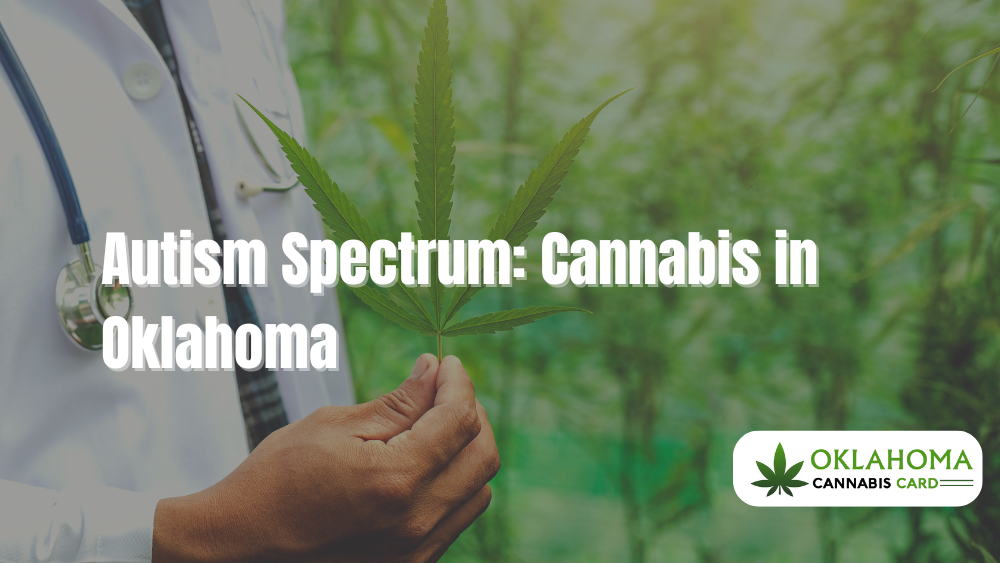 Oklahoma has been at the forefront of medical marijuana reform in the United States since the approval of State Question 788 in 2018. With a highly accessible medical program and over 2,000 dispensaries serving patients across the state, Oklahoma’s medical marijuana program has rapidly grown into one of the most popular systems in the country. However, as more states move toward legalizing recreational cannabis, many Oklahomans are left wondering: what impact could recreational weed have on the state’s established medical marijuana program?
Oklahoma has been at the forefront of medical marijuana reform in the United States since the approval of State Question 788 in 2018. With a highly accessible medical program and over 2,000 dispensaries serving patients across the state, Oklahoma’s medical marijuana program has rapidly grown into one of the most popular systems in the country. However, as more states move toward legalizing recreational cannabis, many Oklahomans are left wondering: what impact could recreational weed have on the state’s established medical marijuana program?
In this article, we’ll explore the potential impacts of recreational cannabis on Oklahoma’s medical program, provide insight into the benefits of maintaining a medical marijuana card, and discuss whether recreational legalization could change the way patients access cannabis. Whether you’re a seasoned medical marijuana patient or someone curious about the differences between medical and recreational cannabis, this guide will help you navigate the ongoing changes in the cannabis landscape.
For those seeking to maintain their medical marijuana card, Oklahoma Cannabis Card offers an Oklahoma Medical Marijuana Card for $129 and renews it every two years for just $99.
Table OF Content
- 1 Oklahoma’s Medical Marijuana Program: A Quick Overview
- 2 What Could Recreational Legalization Mean for Oklahoma?
- 3 Why Keep a Medical Marijuana Card?
- 4 Will Recreational Legalization Affect Medical Cannabis Legislation?
- 5 How to Stay Informed About Changes in Oklahoma’s Cannabis Laws
- 6 Conclusion: Navigating the Future of Medical Marijuana in Oklahoma
- 7 Frequently Asked Questions (FAQs)
- 8 1. Will recreational cannabis affect my medical marijuana card in Oklahoma?
- 9 2. Can I still grow my own cannabis if recreational use is legalized?
- 10 3. Will recreational legalization raise the price of cannabis in Oklahoma?
- 11 4. Will I need to renew my medical marijuana card if recreational use is legalized?
- 12 5. How can I stay informed about changes to Oklahoma’s cannabis laws?
Oklahoma’s Medical Marijuana Program: A Quick Overview
Oklahoma’s medical marijuana program is known for its accessibility and ease of use. Unlike other states with restrictive qualifying conditions, Oklahoma allows doctors to recommend medical marijuana for a wide range of conditions, including anxiety, chronic pain, insomnia, and more. The program has been praised for its patient-friendly nature, with minimal bureaucracy and a streamlined process for obtaining and renewing a medical marijuana card.
To qualify for a medical marijuana card, patients must undergo an evaluation by a certified physician. Once approved, the patient can apply for a medical marijuana card through the Oklahoma Medical Marijuana Authority (OMMA). The card is valid for two years, after which it can be renewed. Medical marijuana patients are allowed to possess and purchase cannabis from licensed dispensaries and can even grow up to six mature plants at home.
What Could Recreational Legalization Mean for Oklahoma?
As of 2024, Oklahoma has not yet legalized recreational cannabis, but the possibility remains a topic of debate. Should Oklahoma follow in the footsteps of states like Colorado or California, it’s important to consider how such a change could alter the state’s cannabis landscape, especially for medical marijuana patients.
1. Increased Access to Cannabis
One of the most significant potential benefits of recreational legalization is increased access to cannabis for adults over the age of 21. If recreational cannabis were to become legal in Oklahoma, adults would be able to purchase cannabis products without needing a medical recommendation. This could make cannabis more accessible for those who may not have a qualifying condition or who are hesitant to go through the medical approval process.
However, it’s worth noting that medical marijuana patients often use cannabis for more than just recreational purposes. Patients rely on cannabis to manage chronic conditions, and for them, access to higher-potency products or specific strains tailored to their needs is crucial. Without a medical marijuana card, recreational users may not have access to these specialized products.
2. Potential Impact on Medical Marijuana Prices
In states that have legalized recreational cannabis, there is often an initial surge in demand for cannabis products, which can lead to higher prices. This is particularly concerning for medical marijuana patients who rely on affordable access to cannabis as part of their treatment plan.
While recreational users may be willing to pay higher prices, medical patients often need a consistent supply of cannabis to manage their symptoms. To address this, some states with recreational programs offer tax breaks or discounts for medical marijuana patients, ensuring they can still afford their medicine. Whether Oklahoma would adopt similar measures remains to be seen, but it is a critical consideration for the state’s medical cannabis community.
3. Effects on Dispensary Supply
Another potential impact of recreational legalization is the effect on dispensary supply. In states like Oregon and Washington, the introduction of recreational cannabis created a rush of new customers, which sometimes led to shortages of certain products. If Oklahoma were to legalize recreational cannabis, dispensaries might struggle to keep up with the increased demand, potentially reducing the availability of certain strains or products for medical patients.
Some states have addressed this issue by requiring dispensaries to set aside a portion of their products specifically for medical patients. This helps ensure that patients continue to have access to the cannabis products they need, even as recreational demand increases. Oklahoma could consider implementing similar protections for its medical marijuana patients if recreational cannabis is legalized.
Why Keep a Medical Marijuana Card?
Even if recreational cannabis becomes legal in Oklahoma, there are several reasons why it may still be beneficial to keep a medical marijuana card. Here are some key advantages that medical cardholders will continue to enjoy:
- Access to Higher Potency Products: Medical marijuana patients often have access to products with higher THC content, which may not be available to recreational users. This is especially important for patients who require stronger doses to manage severe symptoms, such as chronic pain or chemotherapy-induced nausea.
- Lower Costs: Many states with recreational cannabis programs impose higher taxes on recreational sales. Medical marijuana patients, however, are often exempt from these taxes, allowing them to purchase cannabis at a lower cost. If Oklahoma follows this trend, keeping your medical marijuana card could save you money in the long run.
- Larger Possession Limits: Medical marijuana patients are typically allowed to possess and purchase larger quantities of cannabis than recreational users. In Oklahoma, for example, medical patients can currently possess up to three ounces of cannabis on their person and grow up to six mature plants. Recreational possession limits may be more restrictive.
- Caregiver Support: Medical marijuana patients can designate a caregiver to assist them with obtaining and administering cannabis. This can be especially helpful for patients who are homebound or require assistance in managing their treatment.
For these reasons, maintaining a medical marijuana card offers significant benefits, even if recreational cannabis becomes legal. If you haven’t yet obtained your medical marijuana card, you can easily do so through Oklahoma Cannabis Card, which offers new cards and renewals for a straightforward fee of $129, with renewals every two years for just $99.
Will Recreational Legalization Affect Medical Cannabis Legislation?
One of the primary concerns for medical marijuana patients is whether recreational legalization could lead to changes in medical cannabis legislation. While this varies from state to state, many states with both medical and recreational programs have taken steps to ensure that medical patients are still prioritized.
For instance, in California and Colorado, medical marijuana programs continue to operate alongside recreational sales, with specific provisions in place to protect patients’ access to cannabis. These states have maintained distinct medical marijuana systems with separate licensing, taxation, and product availability for medical patients.
In Oklahoma, the state’s medical program is well-established, and it’s likely that lawmakers would take steps to protect the interests of medical patients if recreational cannabis is legalized. However, it’s always important to stay informed about potential changes to the law and to advocate for policies that ensure continued access to affordable, high-quality cannabis for medical use.
How to Stay Informed About Changes in Oklahoma’s Cannabis Laws
As the cannabis landscape continues to evolve, it’s essential for patients and advocates to stay informed about changes in Oklahoma’s cannabis laws. Here are a few tips to help you stay up-to-date:
- Follow updates from the Oklahoma Medical Marijuana Authority (OMMA) for official announcements regarding medical cannabis regulations and any potential recreational legalization efforts.
- Subscribe to newsletters or blogs from trusted cannabis organizations, such as Oklahoma Cannabis Card, which provides regular updates on cannabis laws, patient rights, and industry trends.
- Attend local cannabis advocacy events or town halls where policymakers discuss upcoming changes to cannabis legislation. This is a great way to stay engaged and ensure your voice is heard.
- Consult with your medical marijuana doctor during your regular evaluations to discuss how any changes in the law may impact your treatment plan.
The potential legalization of recreational cannabis in Oklahoma could bring about significant changes to the state’s cannabis landscape. While recreational use may increase access to cannabis for adults, medical marijuana patients still have unique needs that must be protected. By understanding the potential impacts of recreational legalization and the benefits of maintaining a medical marijuana card, you can make informed decisions about your health and cannabis use.
As always, staying informed is key. If you’re a medical marijuana patient or considering becoming one, it’s crucial to remain engaged with the latest developments in Oklahoma’s cannabis laws. If you’re ready to take the next step, Oklahoma Cannabis Card offers a simple and affordable way to obtain or renew your medical marijuana card for just $129, with renewals every two years for $99.
Frequently Asked Questions (FAQs)
1. Will recreational cannabis affect my medical marijuana card in Oklahoma?
While recreational cannabis could increase access for adults, maintaining your medical marijuana card offers several benefits, including access to higher potency products, lower costs, and larger possession limits.
2. Can I still grow my own cannabis if recreational use is legalized?
If recreational cannabis is legalized, the rules regarding home cultivation may change. Currently, medical marijuana patients in Oklahoma can grow up to six mature plants. Recreational cultivation limits may be more restrictive.
3. Will recreational legalization raise the price of cannabis in Oklahoma?
In states that have legalized recreational cannabis, prices often increase due to higher demand. However, medical marijuana patients may receive tax breaks or discounts to keep their costs lower.
4. Will I need to renew my medical marijuana card if recreational use is legalized?
Yes, if you want to maintain access to the benefits of the medical marijuana program, you will need to renew your card. Oklahoma Cannabis Card offers renewals every two years for just $99.
5. How can I stay informed about changes to Oklahoma’s cannabis laws?
Follow updates from the Oklahoma Medical Marijuana Authority (OMMA), subscribe to newsletters from cannabis organizations, and consult with your doctor during regular evaluations to stay informed.





